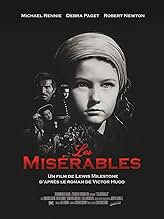Jean Valjean, fuggito di prigione, si rifugia in un convento e adotta una piccola orfana. Ma riportarlo dietro le sbarre sembra essere l'unica ragione di vita del poliziotto Javert.Jean Valjean, fuggito di prigione, si rifugia in un convento e adotta una piccola orfana. Ma riportarlo dietro le sbarre sembra essere l'unica ragione di vita del poliziotto Javert.Jean Valjean, fuggito di prigione, si rifugia in un convento e adotta una piccola orfana. Ma riportarlo dietro le sbarre sembra essere l'unica ragione di vita del poliziotto Javert.
- Regia
- Sceneggiatura
- Star
- Valjean's Coachman
- (non citato nei titoli originali)
- Courtroom Spectator
- (non citato nei titoli originali)
- Cicely
- (non citato nei titoli originali)
- Revolutionary
- (non citato nei titoli originali)
- Student
- (non citato nei titoli originali)
- Judge
- (non citato nei titoli originali)
- Gendarme
- (non citato nei titoli originali)
Recensioni in evidenza
As a great fan of the book (and the musical that came years after this movie version) I am horrified by the major changes that were made to the story. To completely cut out the characters of Eponine and Enjorlas, and a little less so, the Thenardiers alone is something horrible.
Also, it seemed to focus more on Marius and Cosette's relationship than Valjean.
Overall, I would not recommend it to anyone who is a fan of the book or the Les Miserables fandom in general. If you really want to watch a movie version I would suggest the 1934 one.
However if you have no previous experience with Les Mis then you may enjoy it more than I did.
Michael Rennie and Robert Newton are fine actors, but their performances here are no match for Fredric March and Charles Laughton in the earlier film; though Newton is remarkably restrained, his role has been somewhat diminished to accommodate the sappy romance involving Debra Paget and Cameron Mitchell! Besides, it’s compromised by the loss of two small but important scenes from the 1935 version which, in this case, robs the character of essential depth: a) when Javert is humiliated by his peers for his lowly background, and b) when he blackmails newly-appointed Mayor Jean Valjean, a former convict, in his office; unbelievably, it substitutes the first by having Javert’s own father serve a prison sentence on the galley to which he’s himself assigned!
Other conceptual flaws include: Edmund Gwenn’s pivotal role of the Bishop, which comes off as whimsical alongside Cedric Hardwicke’s haunting turn in the earlier film; Valjean is depicted as an illiterate who receives schooling from the intellectual played by Joseph Wiseman (his Method approach feels out of place in a 19th century French setting!); Javert’s conscience-stricken demise here is, disconcertingly, brought about by his brief conversation with James Robertson Justice (as Valjean’s right-hand man); missing from the narrative, though, is the poignant character of Eponine (whose role gave a plausible melancholia to the romantic angle in the 1935 film).
Ultimately, I wouldn’t call the 1952 LES MISERABLES unnecessary, considering that it’s made with undeniable professionalism and the fact that countless other film versions have followed it; perhaps, the late eminent critic Leslie Halliwell summed it best in his claim that it’s “lacking the spark of inspiration”.
In comparison to the 1935 version with March and Laughton, this film stands up well, and looks good, with a literate script. Some characters from the novel are omitted for time constraints, but their absence is not missed.
A good and sturdy version then, not without flaws but carried forward by strong performances, particularly that of Newton, who fits the part of Javert extremely well.
Lo sapevi?
- QuizElsa Lanchester, who plays Madame Magloire, was married to Charles Laughton, the Etienne Javert of the 1935 version of Il sergente di ferro (1935).
- BlooperInstead of a passport printed on yellow paper, to make its nature easily identifiable to all, Valjean is given a passport on regular paper (as evidenced by the fact Valjean did not know its nature until reading its text) with the word "Yellow" stamped across it. This makes no sense and is inaccurate to the way the passports of convicts were handled at the time.
- Citazioni
Jean Valjean: But this is common humanity! Are you a machine?
Etienne Javert: I am an officer of the law doing my duty. I have no choice in the matter. It makes no difference what I think or feel or want. It has nothing to do with me - nothing! Can't you see that?
I più visti
Dettagli
Botteghino
- Lordo in tutto il mondo
- 280.544 USD
- Tempo di esecuzione1 ora 45 minuti
- Colore
- Proporzioni
- 1.37 : 1
Contribuisci a questa pagina








































